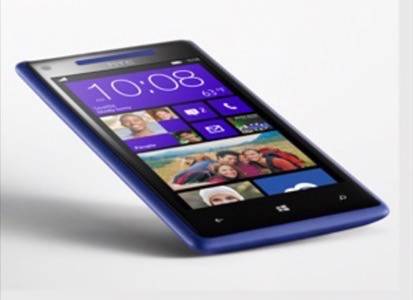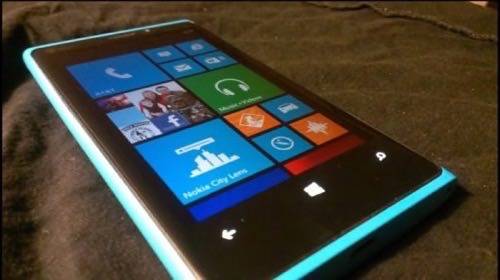
Microsoft has long been a company that relies on its manufacturing partners to spread its Windows operating system. That has been true for Microsoft’s mobile efforts as well, partnering with companies like Samsung, HTC and Nokia for its Windows Mobile CE and Windows Phone platforms. So when Microsoft decided to build its own Windows 8 tablet – the Surface – speculation increased that the company would take a similar route and build its own smartphone. Would Microsoft really be willing to jeapordize its strong ties to its smarpthone partners, like Nokia, and dare to enter the market on its own?
The answer, according to Taiwanese news site DigiTimes, is yes. According to DigiTimes sources, both Amazon and Microsoft have placed orders with Chinese gadget manufacturer Foxconn International Holdings (the same company that builds the iPhone for Apple) for small batches of their own smartphones to be shipped in the middle of 2013.
It is important to note that, as far as smartphone rumors are concerned, DigiTimes is not always to be trusted. The publication has long been a source of unsubstantiated rumors that light fires under hype cycles for new devices, especially those from Apple like the iPad and iPhone. But for a number of reasons, I’m not ready to completely ignore this rumor.
Microsoft Not An Unlikely Manufacturer
While it is only speculation at this point, the notion of Microsoft creating its own smartphone is not as far-fetched as some might think. (For one thing, speculation on the topic has been running for months, see A Surface Smartphone From Microsoft? Yes, Please!) After all, against the industry’s better judgment, Microsoft did create its own tablet in the Surface and has thrown a huge marketing budget behind it. Also, if DigiTimes is correct, the order size for Microsoft is not large. Microsoft may not be jumping into the deep end of the smartphone manufacturing pool, but may be ready to dip a toe in the water.
Mobile analyst Chetan Sharma comments that Microsoft building its own smartphones is a way to both keep the pressure on its manufacturing partners to perform at high levels and hedge its bets by preparing for a possible future of vertical integration (designing and building its own smartphones in the same way Apple does).
“So, if you connect the dots, it is not inconceivable that Microsoft will come out with a smartphone that A) forces OEMs to come out with their best in rapid cycles and B) keeps them in the game if they have to resort to a vertical strategy at some point in the future,” Sharma wrote in an email to ReadWrite. “It is the same dilemma that Google faces. The Nexus line of products is to keep the pressure on the OEM partners as well as prepare for a possible vertical strategy down the road.”

Microsoft’s Manufacturing History
Microsoft is not a complete stranger to building its own devices. It manufactures the popular Xbox video game console and has delved into mobile devices in the past – notably the ill-fated Zune and the disaster that was the Kin phone.
If Microsoft were to make a limited-run Windows Phone device it would likely take a similar route to how Google creates its Nexus devices, which are ostensibly the flagship Android smartphone and tablets that are supposed to be the benchmark for how other manufacturers model their devices. The difference between the Nexus devices and Microsoft making its own flagship smartphones is that Google has its manufacturing partners build the devices for them. The Nexus 4 smartphone is made by LG while the Nexus 7 is made by Asus and the Nexus 10 by Samsung.
The motivation for Microsoft (and to a lesser extent, Google and Amazon) to build their own devices rests just west of San Jose: Cupertino. The Apple iPhone juggernaut has given many mobile manufacturers pie-eyed dreams of being able to integrate vertically and reap the benefits.
“Microsoft (and Google) have also seen the vertical model of Apple succeed beyond their imagination and view it with envy,” Sharma said.
Potential Pitfalls
The problem that Microsoft has is that its entire mobile strategy is built on shaky ground. Windows Phone 8 engenders some loyalty among users and it is considered creative in relation to iOS and Android. But, it is not selling well. That is despite Microsoft CEO Steve Ballmer’s comments last week that it was selling four-times better than last year. Thing is, Microsoft sold only a scant 1.7 million Windows Phones in Q3 2011, so four times that is still not much to brag about in relation to Android and iOS.
Microsoft’s two primary partners for the Windows Phone 8 launch are Nokia and HTC. Microsoft has invested a lot in Nokia to be the flag bearer for Windows Phone and at this point it should be doing everything it possibly can to buoy Nokia until it can once again stand on its own. (That may not be easy, see ReadWrite DeathWatch: Nokia.) HTC has its own problems, losing market share to Samsung and reporting scant earnings in its last quarter.

“They do need to do something to kick start Windows Phone adoption, as its still a meager part of the market. But if they produce a phone, it will hit Nokia in particular really hard,” Jack Gold, principal analyst at J. Gold Associates said in an email. “Nokia is struggling to regain market share, and anything Microsoft would take away from them would be very painful. So I think Microsoft will tread carefully here, as it would be a balancing act between accelerating the market, and hurting your vendors (particularly Nokia but also HTC).”
Microsoft’s position is more precarious than Google’s when it comes to its manufacturing partners. There is little Google can do to hurt most of its partners, short of withdrawing the open source license for Android and consolidating all of its manufacturing to its Motorola subsidiary. Microsoft, on the other hand, could do great damage to Nokia by building its own smartphone. At this point, there are just not enough Windows Phone sales to support the ecosystem. Taking any of those sales away from Nokia could well end up being the straw that broke the camel’s back.
Unlike the Surface tablet, which had no set market and didn’t compete with any manufacturing partners before its release, Windows Phone already is established with manufacturing partners trying to use it to claim mobile market share. Nokia’s entire business is focused on Windows Phone. The potential for collateral damage from a Microsoft-built smartphone is much greater than it was for the Surface.
So, back to the original question. Does Microsoft dare enter the smartphone manufacturing game, when doing so could bury the already fragile Nokia? Or limit the potential of the fading HTC? Or does the vague promise of a Surface-like flagship Windows Phone and/or complete vertical integration outweigh those factors?
I don’t have any inisght into what Micosoft execs are thinking, but I think they will go for it.
Images from Microsoft, HTC and Dan Rowinski.

















